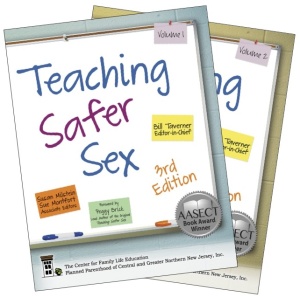 Continuing this week’s focus on the communication lessons from Teaching Safer Sex (volume 1, section 4), today’s lesson has one of those classic and timeless titles. It gets to the point, it reminds you what you’re there fore, and it is a lovely little play on our culture’s hang-ups with language.
Continuing this week’s focus on the communication lessons from Teaching Safer Sex (volume 1, section 4), today’s lesson has one of those classic and timeless titles. It gets to the point, it reminds you what you’re there fore, and it is a lovely little play on our culture’s hang-ups with language.
And that’s what it’s all about, actually: language.
TALK IS A FOUR-LETTER WORD — USE IT!
Objectives
By the end of this lesson, participants will be able to:
- Identify reasons people do not talk with a partner about safer sex.
- Describe the attitudes about sex that are reflected in the slang terms used for sexual body parts and behaviors.
- Demonstrate ability to talk with a partner about sex in a variety of situations.
Rationale
Few of us have life experiences that promote honest communication with a partner about sex. Most young children do not learn the correct names of their body parts; most girls learn no names at all for their genitals. Much of sexuality education that does exist still focuses on reproduction, avoiding discussion of pleasure and desire. Sex talk is cloaked in slang, jokes and gossip. And romantic images in the media create a dangerous fantasy world where couples rarely discuss setting limits or negotiate for safer sex. This lesson seeks to alert participants to these problems and, through role-play, to normalize talking with a partner about sexual safety.
I was teaching a classroom of 10, 11, and 12 year olds last week – it was the first time for me to be in this particular school, and the students were very, very hesitant. That is to say, they screamed when I asked them if they knew what I was there to talk about. They slowly calmed down over the course of the lesson, and eventually dove head-first into questions (lots and lots of questions).
This week when I returned to talk with them, they were excited. Everyone laughed when they saw what was written on my shirt: “Penis is not a bad word.”
Being able to use correct sexual language to talk about sexual issues is a basic, potentially life-saving, absolutely relationship-saving skill. Most kids don’t start out with it, but need to learn it. It’s our job to support them – through lessons like this one!




